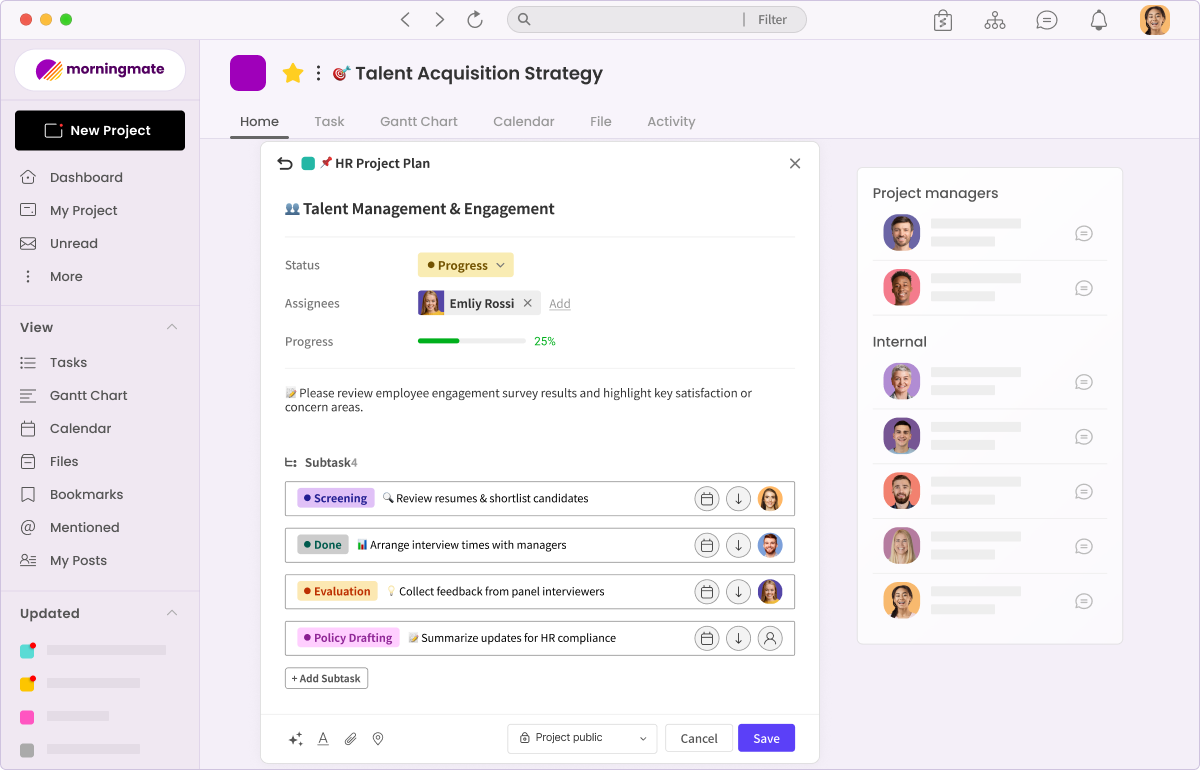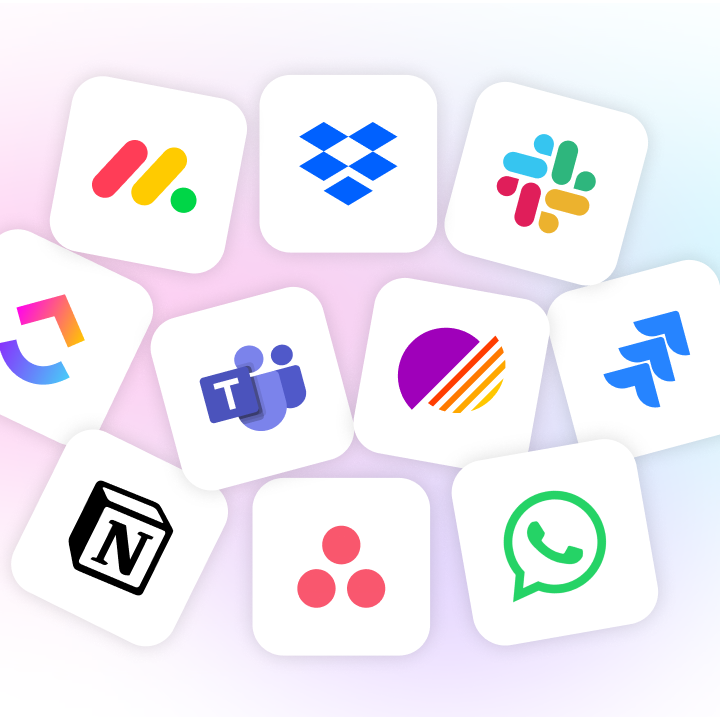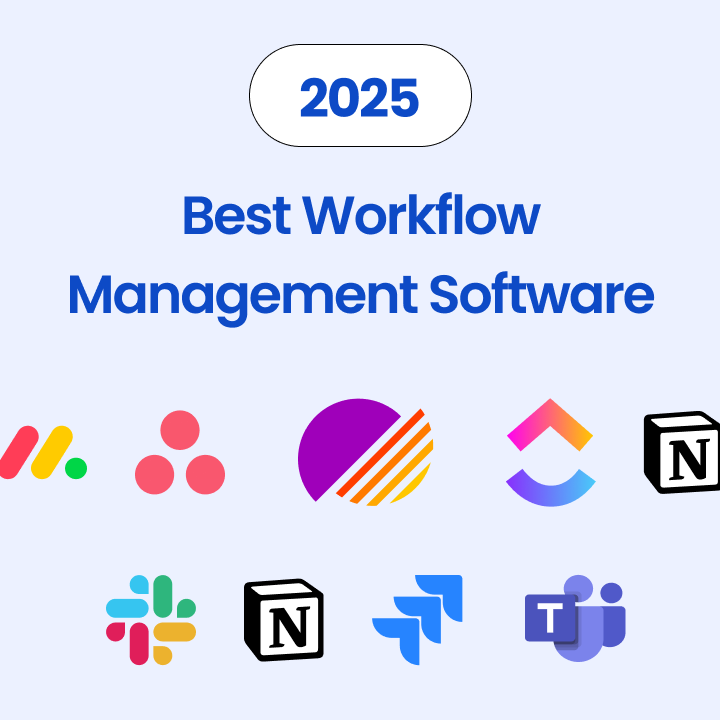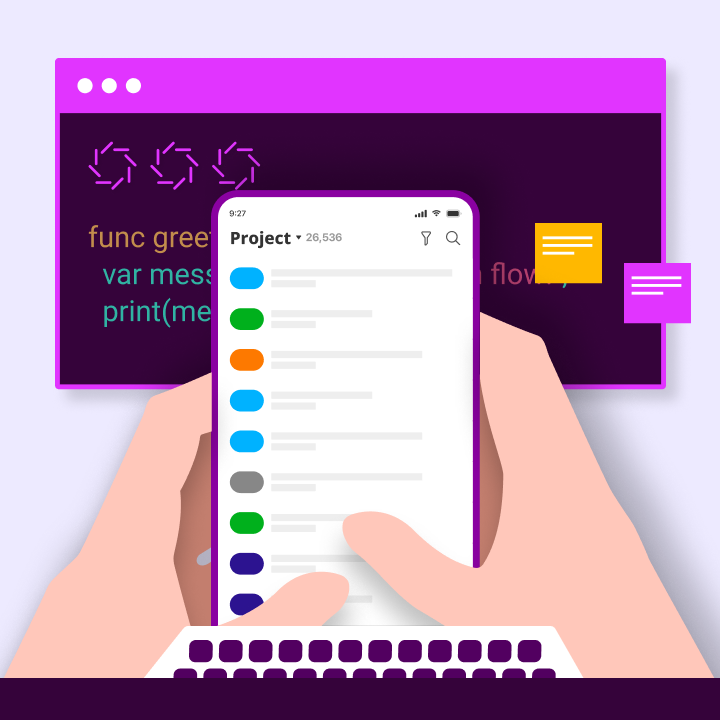Effective marketing project tracking is the backbone of any successful campaign, ensuring tasks stay on schedule and teams collaborate seamlessly. With countless tools available, choosing the right project management software can be overwhelming, especially for marketing teams juggling multiple deadlines and creative workflows.
From content calendars to campaign launches, marketing project tracking tools help streamline processes and eliminate bottlenecks. Whether your team needs agile task management or robust reporting, the ideal software should align with your unique workflow demands. Let’s explore the top options that empower marketing teams to work smarter, not harder.
Best Project Management Tools for Marketing Teams in 2025
By 2025, most marketing pros are sprinting across a dozen channels at once. Budgets shrink, deadlines tighten, and AI suggestions pop up faster than anyone can read them. A single project board now doubles as the nerve center for brainstorms, approval loops, and live campaign pushes..
Why Do Marketers Need Project Management Software?
In today’s fast-paced digital landscape, marketing teams handle dozens of simultaneous campaigns across multiple channels, from social media to email to paid ads. Marketing project management tools provide the structure needed to coordinate these complex workflows efficiently.
Modern marketing requires real-time collaboration between writers, designers, analysts, and stakeholders across different locations. Marketing project tracking software bridges these gaps by providing transparent workflows, clear responsibilities, and measurable progress indicators.
Common Challenges in Marketing Project Execution
Marketing teams juggle multiple campaigns, tight deadlines, and constant revisions, often with no clear system to track progress. Without marketing project tracking software, tasks get buried in endless email threads, files are scattered across platforms, and deadlines slip through the cracks.
Another major pain point is lack of visibility, managers struggle to see who’s working on what, while team members waste time clarifying priorities. Delayed communication leads to duplicated efforts or missed handoffs between design, content, and digital teams. Even simple tasks like updating a social media calendar become chaotic without marketing project software
How Project Management Software Helps Marketing Teams Stay Aligned
Marketing project management software solves these challenges by bringing all tasks, files, and conversations into a single, organized workspace. Features like task assignments, deadlines, and progress tracking ensure nothing falls through the cracks. Automated reminders and dependencies keep teams on schedule.
Beyond task management, marketing project tracking software enhances collaboration with centralized feedback, version control, and approval workflows. Teams can attach creative briefs, assets, and revisions directly to tasks, eliminating endless back-and-forth. Integrations with tools like Slack, Google Drive, and Adobe Creative Cloud streamline workflows further.
What to Look for in a Marketing Project Management Tool
Choosing the right platform can make or break your marketing team’s productivity. With so many options claiming to be the best marketing project management tools, it’s crucial to identify features that actually streamline your unique workflows. Let’s break down the must-have features that deliver real value for modern marketing operations:
- Campaign Planning Features
The best marketing program management software provides robust planning tools like campaign calendars, milestone tracking, and dependency mapping. These features help teams visualize how social media pushes, email blasts and ad campaigns intersect throughout the customer journey.
Effective marketing project management requires seeing strategic goals alongside daily execution. Top tools offer templated campaign frameworks that can be adapted for different initiatives while maintaining consistency. The ability to duplicate successful campaign structures saves countless hours while ensuring nothing gets overlooked in the planning process.
- Workflow & Task Automation
Modern marketing project management software should eliminate repetitive busywork through smart automation. This includes automatic task creation for recurring processes like content approvals, social media scheduling, and performance reporting. The best platforms learn your team’s patterns and suggest optimizations over time.
For marketing program management, automation ensures critical steps aren’t missed when juggling multiple campaigns. Features like automated reminders for draft deadlines, approval requests, and publish dates keep projects moving forward. Some advanced tools even trigger actions based on performance data.
- Visual Boards (Kanban, Gantt, Timeline)
Visual project management is non-negotiable for creative teams. The best project management software for marketing teams offers multiple viewing options like Kanban for daily task flow, Gantt for long-term planning, and Timeline for campaign sequencing. These visual tools help balance creative flexibility with structured execution.
In marketing project management, different stakeholders need different views. Writers may prefer Kanban boards to track content stages, while managers rely on Gantt charts to allocate resources. The best platforms let teams switch between views instantly while maintaining a single source of truth for all campaign elements.
- Team Collaboration & File Sharing
The best marketing project management tools bake collaboration into every task with @mentions, threaded comments, and version-controlled file sharing. This eliminates the endless email chains and “which version is current?” confusion that plagues creative teams. Real-time co-editing features take this further for documents and designs.
For marketing program management, centralized feedback is game-changing. Look for tools that allow annotations on designs, copy edits within tasks, and approval workflows with audit trails. The ideal platform becomes your team’s collaborative workspace rather than just another place to assign to-dos.
- Integration with Marketing Platforms (CRM, Analytics, etc.)
Truly effective marketing project management software connects seamlessly with your existing tech stack, CRMs like HubSpot, analytics platforms like Google Data Studio, and ad tools like Meta Business Suite. These integrations turn your PM tool into a command center rather than an isolated island.
The best project management software for marketing teams pulls live data from connected platforms to inform decisions. Imagine seeing campaign performance metrics alongside task lists or having new leads trigger follow-up tasks automatically. This level of integration bridges the gap between execution and measurement.
- Time Tracking & Workload Management
The best marketing project management tools feature intelligent time tracking designed to help teams, not hinder them. Automated time predictions use historical data to forecast project durations and resource needs accurately. Visual workload heatmaps display team capacity at a glance, preventing overload before deadlines hit.
For marketing project management, analyzing time investment is key to measuring true campaign ROI and profitability. Top platforms reveal insights like average revision cycles for content or disproportionate hours spent on high-value projects. This data helps optimize processes, justify team sizes, and improve future planning.
Top Marketing Project Management Tools Reviewed (2025)
Selecting the right marketing project management software can be challenging with so many options available. The ideal tool depends on your team size, the complexity of your campaigns, and your preferred workflow. Let’s explore the top contenders to help you find the best fit for your marketing needs and budget.
- Morningmate – Best All-in-One Solution for Campaign Teams
Morningmate offers a comprehensive suite of marketing project management tools in a user-friendly platform built for fast-moving teams. It brings together task tracking, file sharing, team messaging, and campaign calendars—without overwhelming users with complexity. Visual tools like Gantt charts and customizable task workflows help teams manage campaigns of all sizes with clarity.

What sets Morningmate apart is its ability to keep creatives, strategists, and clients aligned in real time. Feedback stays organized through threaded comments attached directly to tasks and assets, reducing the need for lengthy email chains. For growing teams that need a flexible yet affordable all-in-one solution, Morningmate offers an excellent balance between simplicity and performance.
- Asana – Best for Enterprise Marketing Teams
Asana is the benchmark for large marketing departments that require robust project management software. Its powerful reporting tools provide executives with clear insights into campaign performance across multiple teams. Customizable dashboards make it easy to track key performance indicators alongside project timelines for informed decision-making.
Although it has a steeper learning curve, Asana’s advanced features are worth the effort for complex organizations. The workload management tools help prevent burnout by indicating which team members are overloaded. For enterprise teams managing simultaneous global campaigns, Asana offers the structure necessary to keep everything aligned.
- ClickUp – Best for Agencies and Startups
ClickUp’s adaptable interface caters to various agency workflows with customizable views, including lists, boards, and Gantt charts. Built-in time tracking enables agencies to accurately bill clients while monitoring project profitability. The template library offers quick-start setups for common marketing campaigns and processes.
What sets ClickUp apart is its White Label feature, allowing agencies to present a branded interface to clients. The platform manages everything from simple task assignments to complex campaign planning in one place. Real-time collaboration tools ensure that distributed teams stay connected, regardless of location.
- Trello – Best for Visual Boards and Simplicity
Trello’s card-based Kanban system provides a highly visual approach to marketing project management. Its drag-and-drop functionality makes it easy to rearrange priorities and workflows. Power-ups enhance functionality for specific needs, such as calendar views or custom fields. The minimalist design helps teams stay focused without unnecessary distractions.
For small marketing teams or straightforward projects, Trello offers just the right amount of structure without added complexity. The mobile app provides full functionality for updates on the go. While it may not suit complex campaigns, it excels at keeping creative workflows organized. New automation features help streamline repetitive tasks.
- Notion – Best for Content and Knowledge Collaboration
Notion transforms marketing project management by integrating documents, tasks, and databases into one cohesive workspace. Its wiki-style pages keep brand guidelines, content calendars, and campaign briefs organized and easily searchable. Flexible databases connect related projects and assets in powerful, customizable ways.
Content teams benefit from Notion’s seamless integration of planning and creation spaces. Real-time editing and commenting enhance collaborative writing processes. While it may lack some traditional project management features, its flexibility makes it a strong choice for teams willing to customize.
- Motion – Best for Schedule Automation
Motion’s AI-driven scheduling automatically optimizes team calendars based on priorities and deadlines. The system intelligently rearranges tasks when unexpected changes arise, keeping projects on track. Calendar integration prevents meeting conflicts and ensures focused work time. Automated time blocking guarantees that high-priority tasks receive dedicated attention.
For managers, Motion instills confidence that deadlines will be met despite disruptions. The platform accounts for vacations, sick days, and urgent requests in its rescheduling. While unconventional, its hands-off approach to time management proves invaluable for overwhelmed teams.
- Wrike – Best for Complex Campaign Planning
Wrike excels at managing intricate marketing campaigns with its advanced Gantt charts and dependency mapping. Interactive timelines visually illustrate how task delays affect overall project schedules. Custom request forms standardize project intake and briefing processes, while proofing features streamline the review and approval of marketing assets.
For large-scale initiatives, Wrike’s project management tools ensure optimal team allocation. The platform seamlessly handles complex workflows across multiple teams and locations. Robust reporting provides insights into team performance and project profitability. Despite its power, the interface remains intuitive for quick adoption.
- Teamwork – Best for Client-Facing Projects
Teamwork integrates client collaboration directly into its project management framework. Dedicated client portals keep stakeholders informed without exposing internal processes. Time tracking connects directly to invoicing for accurate client billing, while milestone tracking sets clear expectations for deliverables and timelines.
Agencies appreciate how Teamwork balances internal task management with external communication needs. The platform’s focus on service businesses is evident in its client-friendly features. Comprehensive reporting demonstrates value to clients through transparent progress updates, all while maintaining an accessible interface for users at all levels.
Feature Comparison Table
| Tool | Task Management | File Sharing | Team Messaging | Gantt / Timeline | Guest/Client Access | AI Features / Automation | Customization & Views | Best For |
| Morningmate | Yes | Yes | Built-in | Gantt chart | Free guest access | Smart notifications, planned AI features | Workflow stages (Kanban view planned) | All-in-one for campaign teams |
| Asana | Yes | Yes | Limited | Timeline | Limited guest roles | Workload tracking, reporting | Boards, lists, calendar | Enterprise marketing teams |
| ClickUp | Yes | Yes | Yes | Gantt & boards | Yes | White label, automation | Fully customizable UI | Agencies and startups |
| Trello | Yes | Power-up needed | Limited add-ons | With Power-Up | Basic sharing | Simple automations | Kanban-style boards | Visual simplicity |
| Notion | Basic task DB | Docs + files | Comments | No native Gantt | Shareable links | Wiki, inline comments | Flexible databases & pages | Content and knowledge management |
| Motion | Yes | Not core | Not focused | AI-driven scheduling | Internal use only | AI time blocking, rescheduling | Limited customization | AI-based time management |
| Wrike | Yes | Yes | Limited | Advanced Gantt | Yes | Proofing, advanced reporting | Custom forms, dashboards | Complex campaign planning |
| Teamwork | Yes | Yes | Yes | Milestones | Client portals | Time tracking, billing | Service-specific tools | Client-facing agencies |
Real-World Examples of Marketing Project Management
Understanding how marketing project management tools function in real-life scenarios helps teams select the best solution for their needs. Here are three common marketing workflows—and how platforms like Morningmate address them.
Example 1: Running a Multi-Channel Campaign
Managing campaigns across social media, email, paid ads, and website content requires visibility and coordination.
Morningmate supports visual Gantt charts and task filtering to give teams a unified view of deliverables across channels. Custom labels and progress stages make it easy to understand what’s in progress, overdue, or completed.
When priorities shift, team members can reassign tasks or add collaborators in real time—without switching tools. Built-in notifications and @mentions ensure that everyone stays informed when deadlines change or action is needed.
Example 2: Content Calendar & Asset Delivery
Marketing teams often juggle blog posts, video scripts, social content, and more. With Morningmate, editorial workflows become easier to manage. Project-based folders centralize all files, task lists, and conversations.
Instead of relying on scattered email threads, teams can comment directly on posts or tasks, tag designers or writers, and track approvals in context. While it doesn’t offer advanced version control, the ability to upload updated files and maintain organized history helps teams avoid working on outdated assets.
Example 3: Stakeholder Communication and Approvals
Morningmate makes it easy to loop in clients, freelancers, or external stakeholders through its free guest access feature. Guests can view posts, leave comments, and stay updated—without additional licenses.
While Morningmate doesn’t provide full client portals or formal digital signatures, approvals can be managed through clear comment threads and status updates. Additionally, project activity logs provide visibility into progress, helping marketers communicate campaign status clearly during reviews or check-ins.
Best Practices for Marketing Program Management
Marketing programs often involve multiple teams, tools, and timelines. Without a structured approach, campaigns can quickly become chaotic and ineffective. Implementing best practices helps marketing teams remain focused, aligned, and productive. Here are three proven strategies to manage your marketing programs more effectively.
Use Templates to Standardize Campaign Launch
Utilizing templates for campaign planning ensures consistency across teams and projects. They help teams avoid missing critical steps, such as defining audience segments or approval timelines. Standard templates also simplify onboarding for new members, as everyone knows what to expect and how to contribute.
Templates can be created within your marketing platform or as shareable documents. They should include task lists, timelines, assets, and messaging frameworks. Over time, you can refine them based on past campaign performance, saving time and enhancing quality for future launches.
Set Clear Objectives and KPIs from Day One
Every marketing program should start with clearly defined goals, such as brand awareness, lead generation, or customer retention. Alongside these objectives, establish measurable KPIs like click-through rates or conversion costs. Clear targets provide direction and focus for the team.
Without KPIs, tracking success or improving performance becomes challenging. Regularly review metrics to stay on course or adjust strategies as needed. When objectives are visible to everyone involved, accountability increases, helping stakeholders align their efforts with broader business outcomes.
Centralize Communication and Documentation
Dispersed emails, chats, and shared folders often lead to confusion and delays. Centralizing all project communication enables teams to collaborate more efficiently and make informed decisions. Use tools that integrate chat, tasks, and file storage in one place, keeping everything accessible and organized.
Documentation should encompass campaign briefs, creative assets, timelines, and approvals. Central access reduces repetitive questions and wasted time. It also aids when team members change or new ones join mid-project. A single source of truth enhances both speed and accountability.
Free Download: Marketing Project Tracking Template
Stay organized and keep your campaigns on track with our ready-to-use marketing project tracking template. This free resource helps you plan tasks, monitor deadlines, and align teams effortlessly. For the best experience, download and customize your template using Morningmate. It’s designed for marketing teams and supports visual boards, collaboration, and real-time updates—all in one place.
FAQ: Marketing Project Software
What’s the difference between marketing and general Project Management tools?
Marketing project tools are specifically designed for campaign workflows, creative reviews, and content calendars. They often include features like asset approvals and marketing-specific templates. In contrast, general project tools focus more on tasks, deadlines, and team coordination. Marketing teams benefit more from tools tailored to their unique needs.
Can these tools integrate with HubSpot, Google Ads, or Mailchimp?
Yes, many marketing project tools offer direct integrations with platforms like HubSpot, Google Ads, and Mailchimp. These integrations streamline campaign tracking, lead management, and reporting. Tools like ClickUp, Wrike, and Asana support numerous marketing app connections. Always check the integration list or use Zapier as a connector.
Are there free versions of these tools for small teams?
Most tools offer free plans with limited features, making them ideal for small teams or startups. Trello, Notion, and ClickUp provide generous free tiers with basic boards and collaboration tools. Morningmate also offers a user-friendly free version designed for marketing use. Upgrading unlocks access to automation, time tracking, and advanced reports.
Try Morningmate for Smarter Marketing Project Management
Are you looking for a marketing-friendly tool that simplifies planning, tracking, and team collaboration? Morningmate offers campaign templates, built-in chat, and real-time dashboards—all in one platform. It’s designed to handle fast-paced marketing workflows with ease. Start your free trial of Morningmate today and experience the difference.




